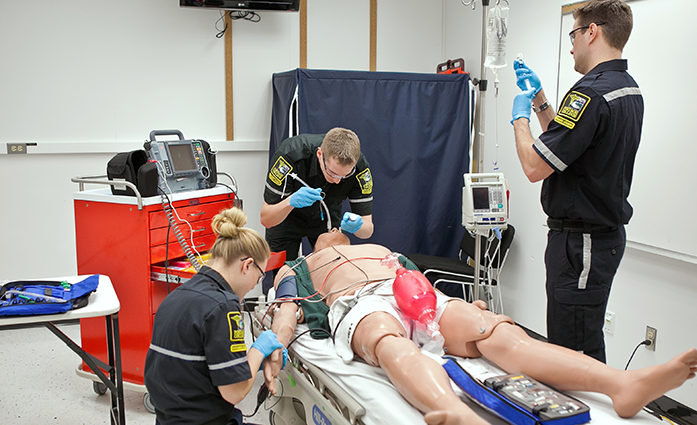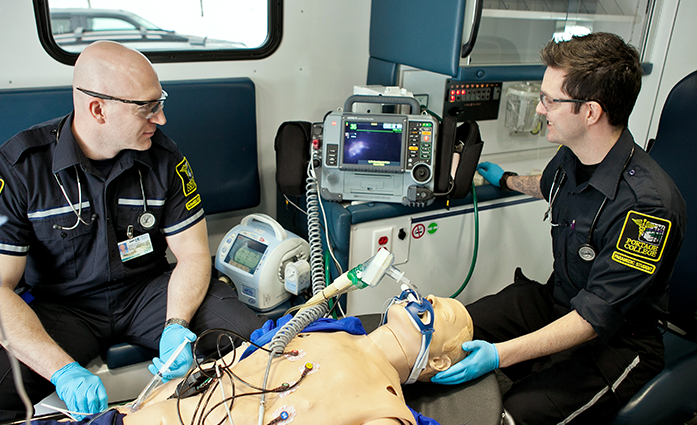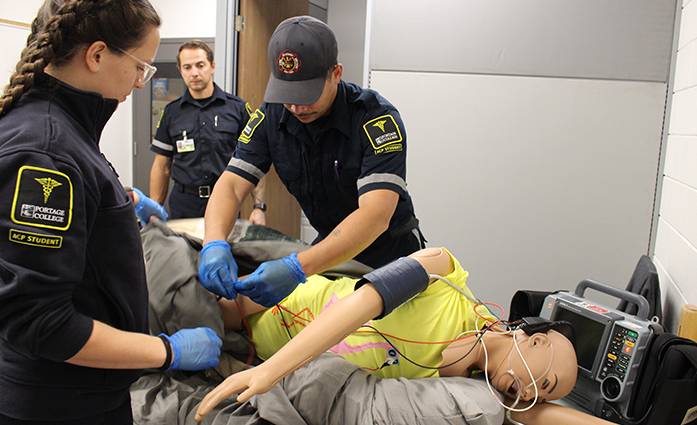Please click the link to view all of our international programs.
Apply For This Program
Get Started in a Career That You Are Passionate About. Click the link to apply today!
Advanced Care Paramedics (ACPs) are integral to Emergency Medical Services and provide advanced life support and medical and trauma care in health services, community, and industrial settings. They may be the first to arrive on the scene, they may be the only provider in remote areas, or they may work collaboratively in a team with other EMS/health care providers, first responders (i.e. Fire, Police) or community support agencies.
The ACP scope of practice includes, but is not limited to, the following: professional responsibilities, communication, health and safety, assessment and diagnostics, therapeutics, integration, transportation, health promotion, and public safety.
The Portage College ACP program is delivered in 2.5 years on a full-time basis using a blended delivery model. This format allows students who are unable to relocate from their home community for the duration of their education program, the opportunity to pursue an Advanced Care Paramedic diploma. By using the multi-modal approach to instruction, students can do the majority of theory instruction from home. For each 3-credit course, students can expect to spend an average of 6-10 hours studying per week.

Get Started in a Career That You Are Passionate About. Click the link to apply today!
Students who complete the ACP program will be eligible to transfer to Athabasca and enter its Bachelor of Science Post Diploma program.
If you would like to receive more information about this program please use the Info Request Form linked here.

During the 13 mandatory onsite weeks, practical skills are assessed at the level of proficiency. Some written exams are scheduled during onsite weeks but students may be required to arrange to have other exams supervised at any Portage College campus or by an approved invigilator when not on site. Students are responsible for all costs associated with exam invigilation external to Portage College. The program includes two ambulance placements and a clinical placement.
Graduates are required to pass the Canadian Organization of Paramedic Regulators (COPR) Entry to Practice Examination to become registered and licensed to practice. This is a national examination at the EMR, PCP, and ACP levels. Upon completion, graduates can register with Alberta College of Paramedics.
Once you fulfill the educational prerequisites and provide the required paperwork, the program advisor will notify you of the exact date and time for the selection assessment. It is mandatory for you to participate in these virtual selection dates.

Career Potential
The significant demand for advanced care paramedics throughout the province in rural, urban and industrial settings provides graduates with a broad range of career opportunities.
Credentials
Year 1: N/A
Year 2: Diploma
Admission Requirements
Educational:
Use this chart to check Provincial high school equivalencies accepted at Portage College. Note: This is just a guide.
Students who do not meet admission requirements can contact Student Services regarding opportunities for placement testing. Students will need to submit an application to the program to start this process.
Required Documents:
Other:
Transferability
Transfer credits listed on the ACAT (Alberta Council on Admissions and Transfer) website will be approved for transfer credit to Portage College. Specific credit awards to a program are subject to the requirements and regulations of the admitting program and may vary from the total credit awarded by Portage College. To determine if this program transfers to other institutions, refer to the ACAT website.
Program Start/End Dates
Year 1 - August 28, 2025 to June 26, 2026
Year 2 - August 28, 2025 to June 26, 2026
Year 2.5 (Practicum) - August 28, 2025 to December 19, 2025
Program Selection Dates
If you have met the educational requirements, you will be contacted by the program advisor with a specific date and time for the selection evaluation.
Location
Lac La Biche Campus, Blended delivery
Domestic Student Fees
Application Fee $53.50
Year 1
Fall Term
Fee payment deadline: August 15, 2025
| Tuition | $3,175.07 |
| Student Association | $116.70 |
| Dental Insurance Fee | $163.25 |
| Health Insurance Fee | $163.25 |
| Technology Fee | $82.71 |
| Recreation Fee | $54.57 |
| Course Materials | $172.50 |
| Total | $3,928.05 |
Winter Term
Fee payment deadline: December 15, 2025
| Tuition | $3,175.07 |
| Student Association | $116.70 |
| Technology Fee | $82.71 |
| Recreation Fee | $54.57 |
| Comptracker | 63.53 |
| Driving Course | 150.00 |
| PBA Training | 275.00 |
| Total | $3,917.58 |
Total tuition & mandatory fees for year one: $7,845.63
Visit Portage Bookstore for textbooks and supplies
Domestic Student Fees
Application Fee $53.50
Year 2
Full Year
Fee payment deadline: August 15, 2025
| Tuition | $6,350.14 |
| Student Association | $233.40 |
| Dental Insurance Fee | $163.25 |
| Health Insurance Fee | $163.25 |
| Technology Fee | $165.42 |
| Recreation Fee | $109.14 |
| Course Materials | $172.50 |
| Comptracker | $127.05 |
| BLS | $3.85 |
| ACLS | $97.35 |
| ITLS | $168.30 |
| PALS | $3.85 |
| TDG | $24.15 |
| WHMIS | $24.15 |
| CAMADA | $60.50 |
| Total | $7,866.30 |
Visit Portage Bookstore for textbooks and supplies
Tuition Deposit: $1500 (non-refundable for oversubscribed programs)
Tuition is calculated using “cost-per-credit” one University credit is $170.00 and one Pre Health-Credit is 198.00. Calculate the cost by multiplying the number of credits per course, course dependent.
Need help funding your education? Check out our funding options.
Students’ Association Fees
These fees are authorized by student referendum and the Board of Governors. They are collected by the College on behalf of the Students’ Association in accordance with the Post Secondary Learning Act.
Health & Dental Fees
You may opt-out of the Dental and Health Insurance plan if you provide proof of comparable coverage for an extended health and/or dental care benefits plan.
Any questions regarding SA Fees including the Health and Dental Insurance fees should be directed to the SA Office 780-623-5609.
Athletics & Recreation Fees
These fees are collected to provide recreation and leisure opportunities that promote students’ physical, social, and emotional well-being, whether online or through in person facilities. Check out your +region in the link, to see what is offered at your campus or online.
Technology Fee
This is a mandatory fee assessed to students enrolling in any credit course (except for apprenticeship programs) at Portage College. The fee supports the on-going maintenance and upgrades to administrative systems that support the entire College infrastructure.
As such, it is considered a “mandatory non-instructional fee” and, therefore, is subject to Alberta Advanced Education Public Post-Secondary Institutions’ Tuition Fees Regulations. Visa students are charged the same rate as Canadian residents for this fee.